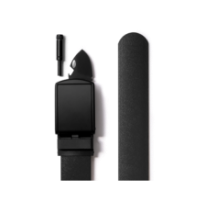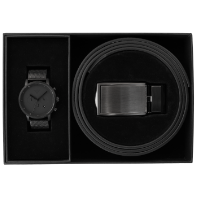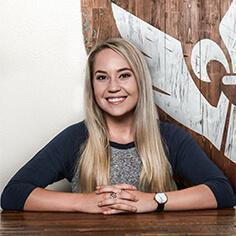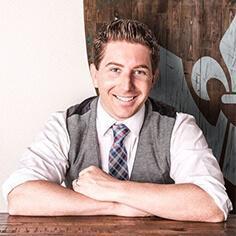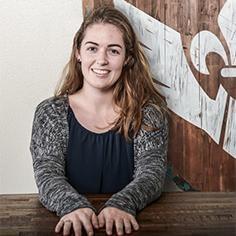THE LOOP
National Small Business Day
We’ve all heard the funny misconceptions about SlideBelts. I don’t know about you, but when I tell people I work for a belt company, I’ve gotten “conveyor belts..?” quite a few times. And then there are the dreaded people who spell our name “Slidebelts,” “slide belts” or even the ones that shorten it in emails to “Slide” as if belts was our last name..?
There’s also the people who mislabel us, with which I’m sure at least a few of you have replied with: “No, that wasn’t us on Shark Tank” “Yeah...we’re a little bigger than a start up” or am I the only one who just keeps explaining and doesn’t stop when people chuckle at the term “ratchet design” when showing our buckle?
Anyway, of all the assumptions or misconstrued notions of what kind of business we are, I never get offended when people mistake us for a “small business.” Coming from a family whose dad started his own business, I even take it as a compliment. Granted, we’re much bigger than my dad’s one-man electrical business, and still much smaller than those Silicon giants, the term “small business” has a rather comforting connotation that accompanies it. One that somehow implies a team of hardworking and determined people. So since today is National Small Business day, whether you consider us one or not, be proud when people call us one, and go support one yourself! *Cough cough* Sourdough anyone?

Always Finish the Race
I found a blog post which makes an interesting comparison of the movie “Cool Runnings” (one of my childhood favorites) and everyday life. In case you’ve never seen the movie, it is based on the true story about the 1988 Jamaican Bobsled team who competed in the Calgary Winter Olympics.
After they qualify for the Olympics, they get three runs, on three separate days. The first run is a disaster, the second run is incredible, and the third one is when they crash. The author breaks these runs down and how they can compare/relate to our lives.
The driver of the 4-Man sled was obsessed with watching the Swiss team practice and compete. Before the Jamaican’s first run, they copied the Swiss’ team style and technique and they weren’t true to themselves. Their first run was a bust, and they ended up in last place after the first day.
After some reflection and pep talks, the team went back to their roots. They were true to themselves, and they were 100% prepared for the second run. Everything clicked and they moved into 8th place.
On the final run, they once again were true to themselves. They were pumped up, and more than prepared. Their starting push time was incredible and the announcer even went as far as calling them “champs” during that run. Unfortunately, that rickety old sled they used couldn’t hold up and they crashed. Most people know what happened next -- they picked up the sled and finished the race.
The author says you can use the three runs they had and make them relate to your life. You can be like the first run and try to be someone else. You can be jealous of other people. You can go off course and not be true to yourself -- and like that last place run by the Jamaican team, you may also see yourself finishing in last. You won’t be happy when you look at yourself in the mirror, because you aren’t being true to who you are.
You can be like the second run and be true to yourself. Many of us are blessed with special and unique gifts. Whether it’s the gift of kindness or being understanding, the gift of humor, or just being a loyal friend, we all have something that makes us who we are. When you realize what you can offer, it is important to use our gifts for good. When you do this, you will see the fruits of your labor.
The third run is the true reality of life. Sometimes you can be prepared. Sometimes you can go into a situation or relationship with all of the best intentions in the world. Sometimes you can be the best “you” possible, but something will still go wrong. That is life. However, just like those four Jamaicans who crashed the sled, you can get up and finish the race. Always finish the race.

The Benefits of being Bilingual
As SlideBelts crusaders, we are constantly looking for new ways to improve our business, our products, and ourselves. One way to work on self-improvement, is to work on becoming bi-, tri-, or quadlingual.
Studies have shown that adults that speak more than one language are more likely to
- understand others' points of view- switch between tasks quickly
- be better at planning, prioritizing, and decision making
- have a better working memory
among other things, when compared to monolingual adults.
It has also been argued that knowing and practicing a second language can delay the onset of dementia and Alzheimer's for almost 5 years.
In addition to these cognitive benefits, knowing a second, third, fourth language offers a multitude of social benefits. The world becomes more open. You can comfortably travel to more places. You can multiply the amount of literature or film available to you. You can expand your friend circles.
This week, I challenge you all to improve yourself in some way. And if you decide to do this through studying another language, hurrah! I highly recommend German. (I'm going to need someone to practice with when I return.)
If you want to learn more about the benefits of bilingualism, and see where I got the above information, check out this article.
And here's various free online services that could aid you in the acquisition of your new language:
Free podcasts on your favorite music streaming program (iTunes, Spotify, ...)
